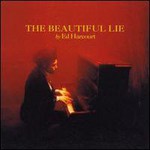The Beautiful Lie The Beautiful Lie
Studio Album by Ed Harcourt released in 2006Studio Album by Ed Harcourt released in 2006The Beautiful Lie review
Harcourt Gets The Better Of Himself
A British singer-songwriter Ed Harcourt is back with his fifth and the most exquisite album The Beautiful Lie, full of despair, madness and gothic storytelling sustained by melodramatic violins and lush choruses. Harcourt represents a uniquely English talent, whose masterful material and dark melancholia stand out against the background histrionic angst of the majority of today bands. The Beautiful Lie is a great deal more poignant and delicate than his previous records (Maplewood, Strangers and others), it is not overfilled now, though still employs a rakish collection of weird and wonderful instruments. The 15 tracks of the album are innately personal songs, in each of which Harcourt appears in his epic orchestral, wistful best, proving that it takes effort not to let up in quality and time to grow truly prodigious.
The Beautiful Lie Tells a Life Story
On the latest Harcourt’s album eloquent delivery and form have found balance and synchronicity. There is hardly a weak spot in any of the tracks. The indie and pop singer-songwriter stirs the listeners with Tom-Waitsian rhumba-rock groove supported by strings and spiky astringent guitar in I Am The Drug, that is alongside with the bone-rattling and schizophrenic Scatterbraine a center point of the record. More reflective and soulful songs like the beautiful, old-fashioned orchestrated You Only Call Me When You’re Drunk, The Last Cigarette, Good Friends Are Hard To Find, wonderfully woozy Late Night Partner, unashamedly melodramatic Until Tomorrow Then and the haunting cobweb and lace romance of Braille provide a curious, lopsided aside to Harcourt’s graceful drama. The plodding piano, the gentle sway of a chamber orchestra, the muted vocal delivery, the Shadowboxing percussion, the sweeping lyrical eloquence and the delightfully twisted subject-matter make up an inch-perfect work, that can be regarded as a sort of summary of a human’s life.
Harcourt Is Difficult to Ignore
On the whole, The Beautiful Lie is a collection of believable songs and lyrics that Keats would be proud of, as it dwells upon eternal questions. Perhaps, the lack of chart recognition of Ed Harcourt is quite understandable: his songs require listening and reflecting, though some murderously catchy pop segments and surprisingly upbeat melodies (Visit From The Dead Dog) will prevent you from sinking into depression. Although Ed Harcourt has been considered by many to be on the cusp of greatness ever since his mini-album Maplewood hit the shelves six years ago, now he has truly fulfilled his potential, in a way acting as a follower of Tom Waits. Those loving Ray Davies, Brendan Benson, Ron Sexsmith and Matthew Jay will definitely get to like Harcourt. A veritable musician, he will touch the coldest of shoulders and involve in listening.
The Beautiful Lie review
Harcourt Gets The Better Of Himself
A British singer-songwriter Ed Harcourt is back with his fifth and the most exquisite album The Beautiful Lie, full of despair, madness and gothic storytelling sustained by melodramatic violins and lush choruses. Harcourt represents a uniquely English talent, whose masterful material and dark melancholia stand out against the background histrionic angst of the majority of today bands. The Beautiful Lie is a great deal more poignant and delicate than his previous records (Maplewood, Strangers and others), it is not overfilled now, though still employs a rakish collection of weird and wonderful instruments. The 15 tracks of the album are innately personal songs, in each of which Harcourt appears in his epic orchestral, wistful best, proving that it takes effort not to let up in quality and time to grow truly prodigious.
The Beautiful Lie Tells a Life Story
On the latest Harcourt’s album eloquent delivery and form have found balance and synchronicity. There is hardly a weak spot in any of the tracks. The indie and pop singer-songwriter stirs the listeners with Tom-Waitsian rhumba-rock groove supported by strings and spiky astringent guitar in I Am The Drug, that is alongside with the bone-rattling and schizophrenic Scatterbraine a center point of the record. More reflective and soulful songs like the beautiful, old-fashioned orchestrated You Only Call Me When You’re Drunk, The Last Cigarette, Good Friends Are Hard To Find, wonderfully woozy Late Night Partner, unashamedly melodramatic Until Tomorrow Then and the haunting cobweb and lace romance of Braille provide a curious, lopsided aside to Harcourt’s graceful drama. The plodding piano, the gentle sway of a chamber orchestra, the muted vocal delivery, the Shadowboxing percussion, the sweeping lyrical eloquence and the delightfully twisted subject-matter make up an inch-perfect work, that can be regarded as a sort of summary of a human’s life.
Harcourt Is Difficult to Ignore
On the whole, The Beautiful Lie is a collection of believable songs and lyrics that Keats would be proud of, as it dwells upon eternal questions. Perhaps, the lack of chart recognition of Ed Harcourt is quite understandable: his songs require listening and reflecting, though some murderously catchy pop segments and surprisingly upbeat melodies (Visit From The Dead Dog) will prevent you from sinking into depression. Although Ed Harcourt has been considered by many to be on the cusp of greatness ever since his mini-album Maplewood hit the shelves six years ago, now he has truly fulfilled his potential, in a way acting as a follower of Tom Waits. Those loving Ray Davies, Brendan Benson, Ron Sexsmith and Matthew Jay will definitely get to like Harcourt. A veritable musician, he will touch the coldest of shoulders and involve in listening.


